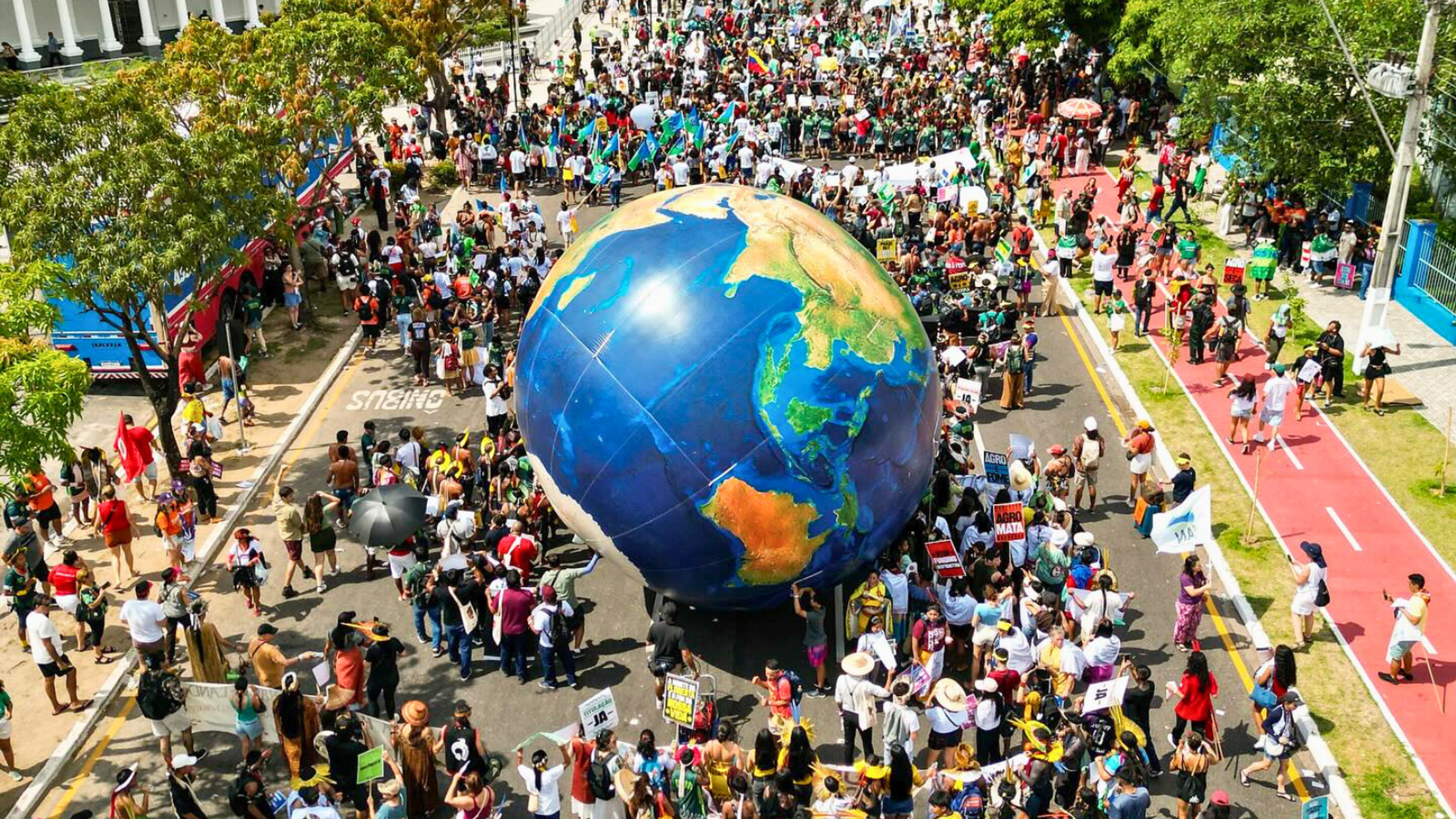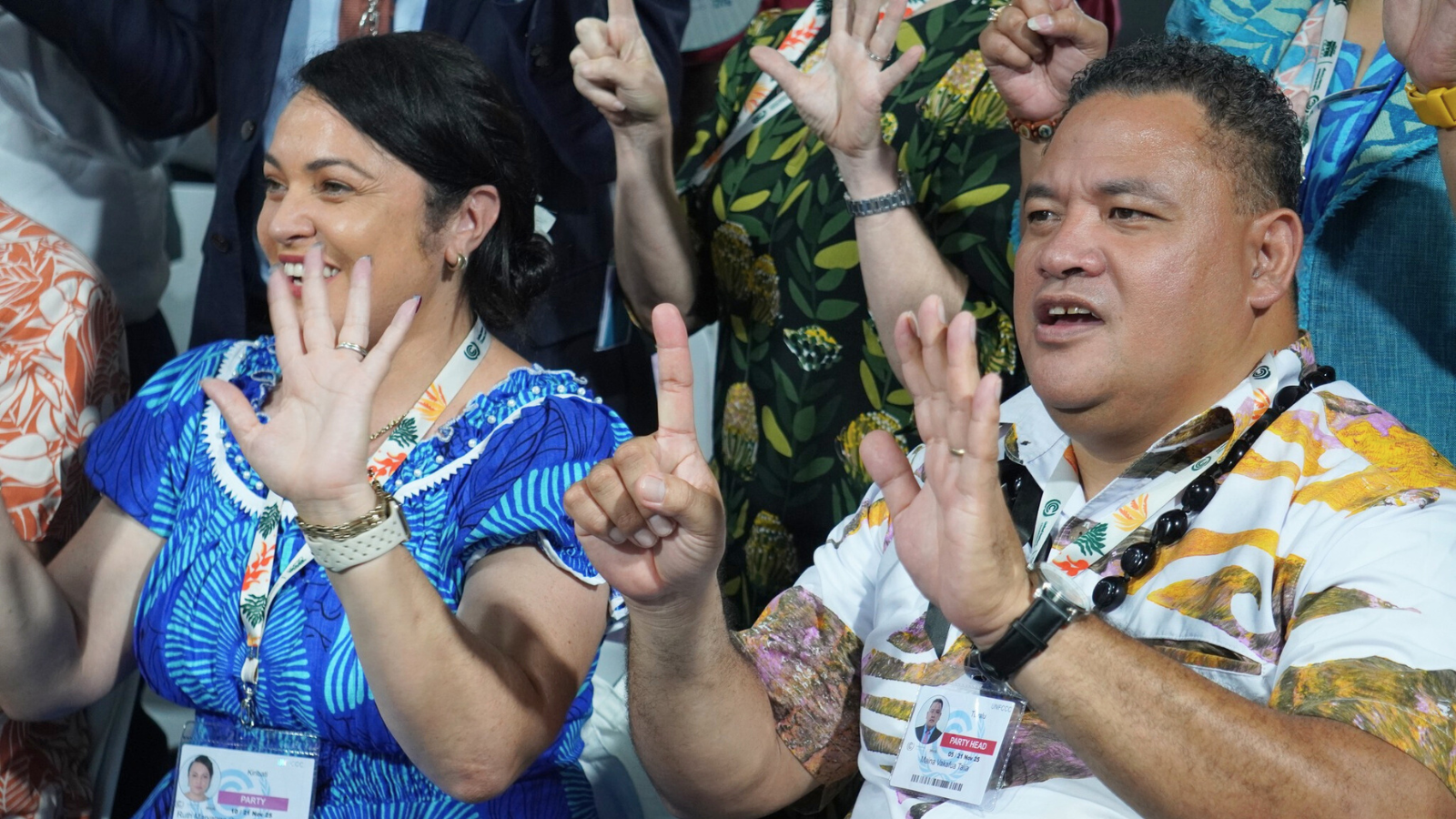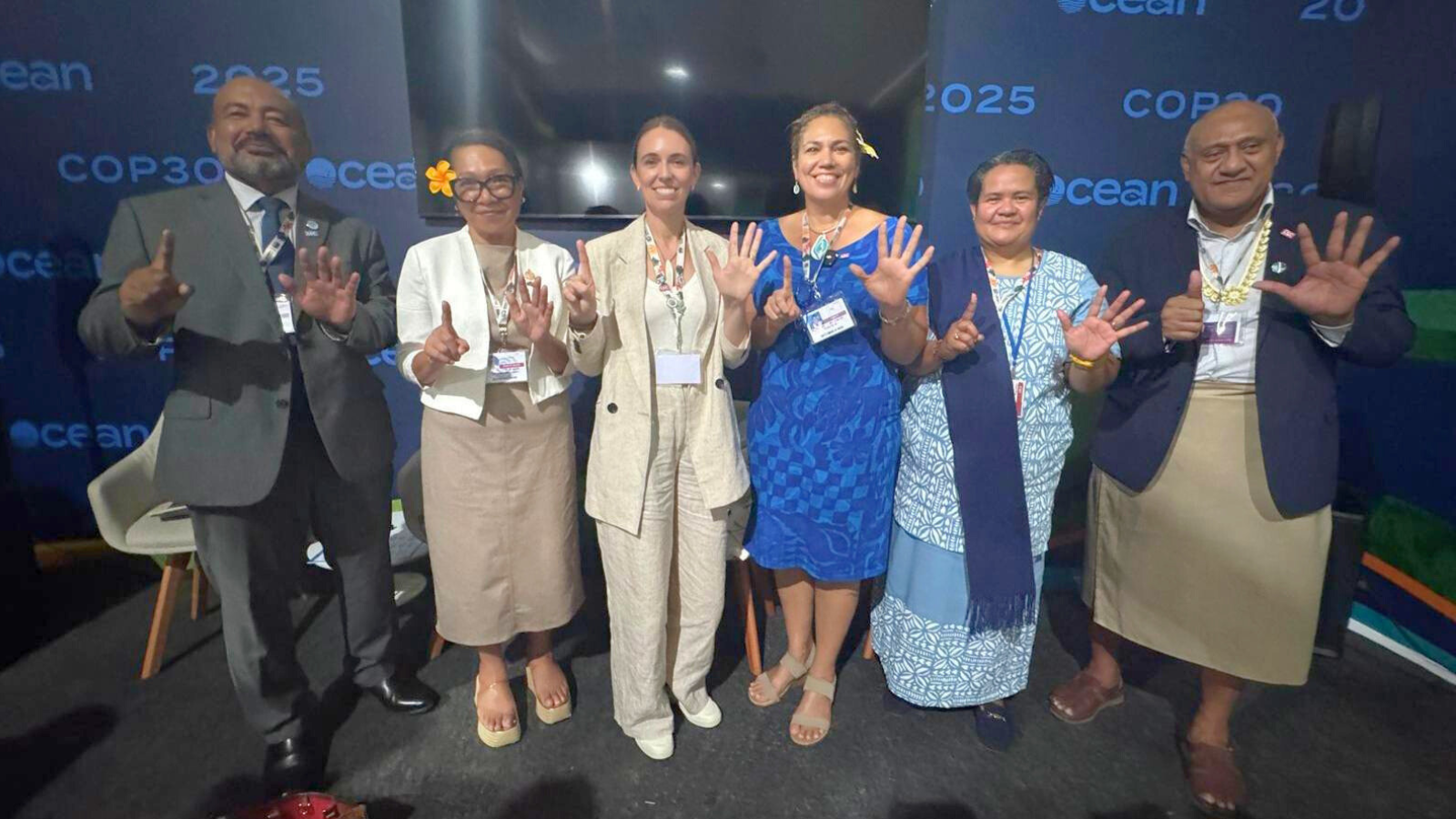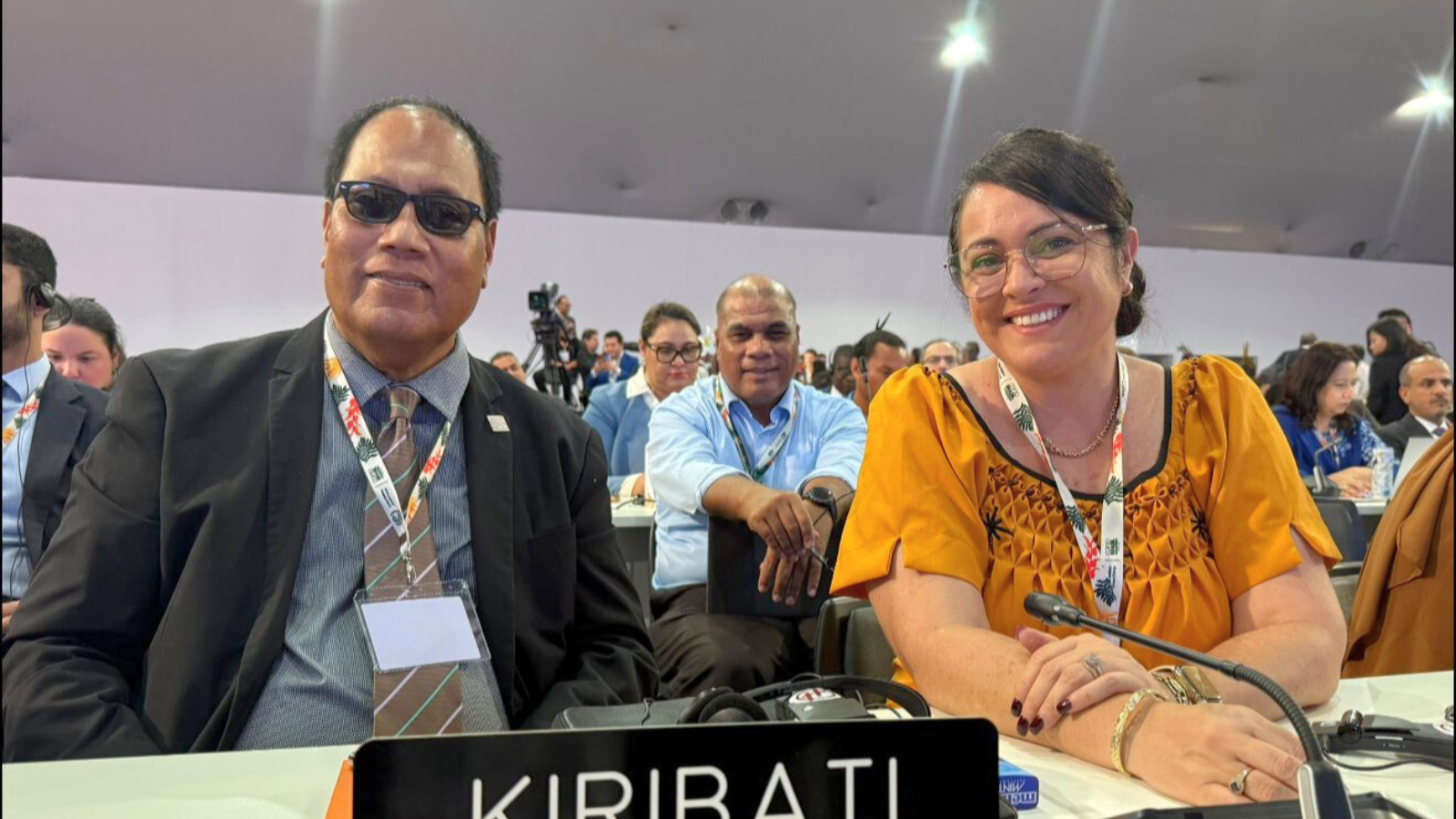

The streets of Belém during the COP30 meeting.
Photo/Fossil Fuel Non-Proliferation Treaty/Facebook
Pacific leaders are at COP30 with a simple message: Keep 1.5°C alive and give us money
With negotiations intensifying in Belém, Pacific voices warn that the cost of inaction is already being felt across the islands, urging action before it’s too late.


Moana Pasifika end Lautoka curse to win 'Battle of the Pacific'


A.R.T sets new Pacific music pace with ‘First Thursday’ releases


Moana Pasifika end Lautoka curse to win 'Battle of the Pacific'


A.R.T sets new Pacific music pace with ‘First Thursday’ releases
Pacific leaders are at the 30th Conference of the Parties (COP30) in Brazil with a warning that can’t be ignored: the climate crisis is already here, and the world must act fast.
From rising seas to shifting fisheries, communities across the region are feeling the impact of climate change, even as global emissions continue to rise.
At the ‘COP of truth” United Nations Framework Convention on Climate Change (UNFCCC), Pacific delegates have arrived with a familiar yet urgent message: time is running out to maintain the 1.5°C threshold, and immediate action is needed to implement viable climate solutions and mobilise major climate finance.
Their patience is wearing thin. Lisa Leilani Williams, editor of the Pacific Leader, told William Terite on Pacific Mornings that the political negotiations are underway, and the pressure is mounting.
“They’ve had big statements once more from the UN team on climate, reminding them of the goal that’s ahead of the task that needs to be done to track us to a 1.5 friendly-facing outcome by Friday,” she says. “At the moment, it looks very much like we’re going to overshoot and stay there if the ambition is not absolutely good and confirmed at this meeting.”
Williams says that while Pacific leaders bring “the energy to this space”, larger emitters continue to fall short on ambition.
Watch Lisa Williams' full interview below:
“There’s still a lot of talking and walking”, but progress is slow, she says, noting that Brazil’s shift from forests to oceans has provided a rare boost for Pacific delegations.
“That desire, that will and determination is still a very strong part of the language… the ocean climate nexus is nowhere near where it has to be,” Williams told Terite.
Tuvalu’s Minister Dr Maina Talia told the Leader that this COP must not roll back progress. “It’s not just a number, it spells our demise if we aren’t going to address the 1.5,” he says.

Tuvalu's Minister of Climate Change, Maina Talia, signals "1.5" at the PRF Partners Roundtable. He is pictured with Kiribati's Minister of Women, Ruth Cross Kwansing. Photo/Semi Malachi/Facebook
As the Political Champion for Mitigation, representing the small island states, Talia says collective efforts are needed, especially in the wake of the United States’ withdrawal from the Paris Agreement.
“The more we mitigate, the less we have to adapt. For a country like Tuvalu, with very limited resources… It’s important that we take ownership of what we’re saying.” Tuvalu is currently chair of the Pacific Small Island Developing States (PSIDS) group.
The conference ends on Saturday, NZT, and has seen Pacific delegates consistently stress that success hinges on stronger global commitments to peak emissions by 2025, faster access to climate finance, and recognition of the unique needs of PSIDS.
Due to the exclusion of ocean issues from the formal COP agenda, Dr Filimon Manoni, the Pacific Ocean Commissioner, hosted an Ocean Dialogue last week to emphasise the need for action and advocate for COP31 to be held in Australia.
He told the Leader, “We are looking for a stronger outcome… more could be done to mainstream the agenda.”
Former New Zealand Prime Minister Dame Jacinda Ardern, now COP30’s Special Envoy for Oceania, says amplifying Pacific voices is key. “What motivates me is seeing Pacific-led solutions.”

The Ocean Dialogue featured (L-R) Dr Pio Manoa, Hon Mona Ainu’u, Dame Jacinda Ardern, Coral Pasisi, Finau Soqo and Dr Filimon Manoni. Photo/Pacific Ocean Commissioner/Facebook
Fiji Minister Mosese Bulitavu, the Ocean Champion for small island states, pointed out that while ocean issues are central, “it isn’t fully anchored in the UNFCCC process” and still lacks funding.
Dr Pio Manoa, Deputy Director of the Forum Fisheries Agency, told the media in Belém that climate change is raising costs. “Our fish are moving, and as temperatures increase… our fish are moving outside [exclusive economic] zones, and that will have a big impact on our national economies and our communities.”
The Pacific’s hopes for COP30 are framed by the 2050 Strategy for the Blue Pacific Continent, a long-term plan aimed at safeguarding future generations, strengthening regional ties, and achieving net zero emissions by 2050.
The leaders say the Pacific contributes less than one per cent of global emissions but experiences the most severe consequences from extreme weather events such as cyclones and droughts. They also want climate finance to reflect the true scale of loss and damage already happening.
Many believe that real progress at COP30 must include the development of new, simpler financing projects. The Pacific Resilience Facility (PRF), the region’s main climate finance project, is central to this effort. Finau Soqo, the PRF’s general manager, says they have secured US$167 million (NZ$295m) so far, but need much more to reach the US$500m (NZ$884m) goal by 2026.
“We haven’t even met the US$100 billion (NZ$177b) goal,” she says during a media briefing, referring to global commitments made more than a decade ago. “Billions go into global vertical funds, yet people are still being left behind, and none more so than in the Pacific.”
What is the Pacific Resilience Facility? Watch below to find out.
Soqo says the PRF aims to address this imbalance by supporting small, community-led projects that bigger funds might overlook. But progress also relies on political decisions that extend beyond COP30, such as whether Australia, with strong support from Pacific nations, will host COP31. “Where attention goes, energy flows,” Soqo says. “If Australia hosts COP31 as a Pacific COP, it completely changes the dynamics for us in terms of mobilising resources.”
Gender and social inclusion are also important for the Pacific. Kiribati’s Minister for Women, Youth, Sport and Social Affairs, Ruth Cross Kwansing, who is now the region’s Political Climate Champion for Gender, says climate action should not only regard women and marginalised groups as beneficiaries.
“The data strongly suggests we need to rethink the narrative,” she tells the media. “Women are not just contributors, they are a very key part of the work ahead.” She warns against weakening gender language in negotiations and says the Pacific will keep gender action plans aligned with the 2050 Strategy and current regional commitments.
Kwansing says global climate platforms must recognise the real experiences of frontline communities. In Kiribati, rising sea levels threaten homes, food supplies, and cultural survival. The country’s new Climate Financing Strategy focuses on land reclamation and coastal protection.
Zarak Khan, Director at the Pacific Islands Forum Secretariat (PIFS), urged the regional media during a briefing hosted by the PIFS to hold major emitters accountable for their lack of attendance or engagement at COP30.
“Countries like China, India, and the United States should really be here in the negotiating rooms,” Khan says. Talia agrees, saying that countries like the US, “have the power, they have the money, they have the resources… and we really need them in the equation”.

Vice President of Kiribati Teuea Toatu and Minister Ruth Cross Kwansing in Belém on the first day of COP30. Photo/Ruth Cross Kwansing/Facebook
Khan says, “Our single most important element at this COP is maintaining the path to 1.5 degrees. The Pacific hasn’t given up. We haven’t thrown in the towel.”
As Pacific negotiators engage in various discussions, they face shrinking opportunities and limited resources. Some delegates have spent three or four days travelling from their islands to Brazil, while others must decide which meetings to attend due to a shortage of people and funding.
“We are the most disadvantaged,” Khan says. “But our teams are working… to make sure our people are heard.”
As the world enters another crucial year for climate action, the Pacific’s expectations for COP30 remain the same as they were for the Paris, Glasgow, and Dubai conferences: the cost of inaction is measured in financial terms, lives, culture, sovereignty, and the survival of island nations, not just in dollars.
“Our people are depending on us,” Soqo says. “It’s a David and Goliath fight, and we have to do whatever it takes.”